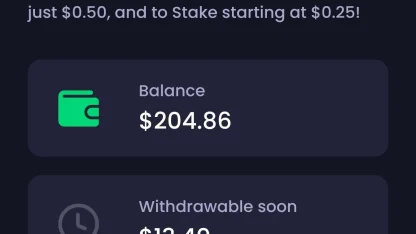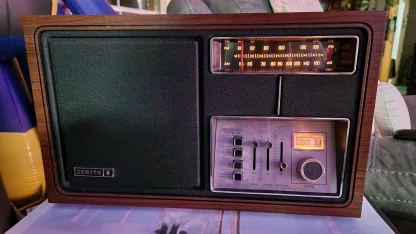Xpress Platinum Countertop Cooker





Our Take
- Yes, it’s like a George Foreman grill, but it’s not quite a knockoff since it can do other stuff- Along with grilling, it fries, broils, and bakes, so in your face, Foreman, you pathetic chump- Small enough to sit on your counter, pans are dishwasher-safe, it’s almost too good for your kitchen but we’ll let you have it anyway- We were just kidding before, George, please don’t punch us- Model: Xpress-PCBB (the current record-holder for “most lowercase letters in a model number”)
Slow Platinum: Albums That Took Years to Sell a Million
Hey, contributor @JasonToon here. This Xpress Platinum cooker has two hot plates, to get at your vittles from both sides like a Foreman grill, so it cooks things pretty fast. For this Sunday’s weekend playlist, I thought, "Hmm… platinum… fast… what if I did a list of albums that went Platinum, but really slowly?"What makes a record sell a million copies… but take ten, twelve, twenty years to do it? Sometimes it’s new fans of a band reaching back to their old stuff. Sometimes it’s an evergreen cult classic that new generations of kids keep discovering. Sometimes, as we’ll see, it’s just accounting weirdness.By “Platinum”, I mean “certified by the Record Industry Association of America as selling one million albums or more.” While it’s easy to find lists of albums that sold hit that mark in their first week, or month, it’s much harder to figure out which albums took a decade or two. I had to rely on a mixture of news searches and wild guesses on the RIAA’s not-always-highly-functional Gold & Platinum search tool. So I can’t say these are the albums that took the longest to go platinum. Just that they took a really long time.I stuck to albums for this list (also compiled on YouTube for autoplay fun); I’m saving slow-burning singles for a future playlist. And one other rule: no greatest-hits collections or other compilations. I love best-ofs - when in doubt, I always start there - but they’re not what we talk about when we talk about albums.**Weezer - Pinkerton (20 years)**The quintessential example of an album universally dismissed on its release (including by its creator, Rivers Cuomo, who called it “embarrassing”) eventually becoming a consensus classic. “The Good Life” was one of three flop singles from the album that seemed to consign Weezer to the same ‘90s cutout bin as Four Non Blondes and Fastball. https://d2b8wt72ktn9a2.cloudfront.net/mediocre/video/upload/v1736558923/73bea5ccd40bcf93aca1bd6ee0593dbd.mp4**Queen - A Night at the Opera (27 years)Sometimes the RIAA does this weird thing where they ceremoniously certify a bunch of obviously high-selling albums by the same artist at the same time. I’m sure 1975’s A Night at the Opera sold a million copies in the U.S. long before it was certified Platinum in 2002. But hey, all I can go by is the official numbers. Anyway, we’ve all heard “Bohemian Rhapsody” a million times, so here’s “Sweet Lady”.Willie Nelson - The Red-Headed Stranger (11 years)Before The Red-Headed Stranger (1975), Willie Nelson was a reasonably successful solo artist whose voice was considered too uncommercial to reach outside the country audience. Ever since, he’s been an icon of American music. Given the RIAA’s reputation for under-counting country sales, it probably deserved to go platinum well before its 1986 certification. But there’s no doubt it deserves its place as a transcendent achievement in country music history.They Might Be Giants - Flood (19 years)**Obviously we’re all familiar with this one at Meh HQ, from the band who wrote us not one but two theme songs. Some of us (me) saw TMBG live on this tour. How it took nineteen years for a million Americans to catch on, I’ll never know. Anyway, I’m taking this opportunity to big-up what I think is the most overlooked song on Flood, the ultra-catchy frat-rock parody “Twisting”. **The Who - Tommy (24 years)Another one of those ceremonial mass-certification deals, with the RIAA officially Platinumizing nine Who albums on the same day in 1993. I’ll be honest: for me, this is where the Who started to go wrong. But of course there are still some great songs here. You know “Pinball Wizard” so let’s hear “Go to the Mirror”, which is more representative of the overblown theatrics of the album as a whole (but in a good way).The Temptations - Give Love at Christmas (19 years)For an album to go platinum after so many years, there’s gotta be some reason for sales to be steady but never too huge in any given year. A Christmas album by a major artist makes perfect sense: some people will buy it every year, but nobody’s going to buy it between January and October. This 1980 album isn’t the Temps in their prime, but as the title track shows, it’s soulfully festive enough to keep on selling right up to its 1999 Platinum certification.Green Day - Kerplunk (11 years)Another likely candidate for the slow burn: the pre-fame releases by indie bands turned superstars. Dookie fans weren’t disappointed when they dug into Green Day’s back catalog. Kerplunk is basically more of the same, which made the album one of the biggest-selling indie-label releases ever, and funded Lookout! Records’ increasingly ill-advised signings for the next decade. When Green Day and other major Lookout! bands pulled their releases in 2005 over unpaid royalties, the label essentially collapsed. But when Kerplunk was released in 1991, all that ugliness was, you might say, “2,000 Light Years Away” (sorry).Jethro Tull - Aqualung (18 years)Hey, just because I kinda hate a record doesn’t mean I’ll leave it out of this list. Tull’s 1971 opus Aqualung, like it or not, is a persistent presence in the culture, shuffling steadily toward Platinum status in 1989. “Up To Me” is one of the “best” songs on the album; better yet, it’s one of the shortest.GZA - Liquid Swords (20 years)Hip-hop records on this list are rare because hip-hop has always been driven by immediacy: last year’s records are old news. Wu-Tang Clan and its members’ solo careers are an exception. “Cold World” blends eerie atmosphere, '70s soul, martial-arts philosophy, and raw NSFW tales of inner-city violence into the sound that put Liquid Swords at the cutting edge in 1995 and kept it there ever since, lifting it to Platinum status in 2015.U2 - Boy (15 years)**Same phenomenon as Green Day: weird little band turns into huge big band, so their early records start selling, too. By 1995, Boy had become probably the biggest-selling album (in the US, anyway) that could be called “postpunk”. A song like “Stories for Boys” shows how U2 built a bridge from its chilly avant-garde inspirations to the stadium-sized pomp of their commercial breakthrough. **“Weird Al” Yankovic - Dare to Be Stupid (18 years)**I bet “Weird Al” himself wouldn’t have expected his pop parodies to keep selling so long after the originals had faded, but there’s something eternal about his exuberantly brainy idiocy. The likes of “Yoda” keep Dare to Be Stupid evergreen for generation after generation of likeminded nerds who’ve never even heard the Kinks’ “Lola”. I’ll admit I’ve been somewhat resistant to Al’s charms since puberty, but Yankovic superfan @matthew is bringing me around. https://d2b8wt72ktn9a2.cloudfront.net/mediocre/video/upload/v1736559033/0b8a567ed3a359ed5197da4b4d65fce7.mp4**Sex Pistols - Never Mind the Bollocks, Here’s the Sex Pistols (15 years)**Another album that will just live essentially forever, thanks to its essential status among a certain cohort of youths. When I first heard “Holidays in the Sun”, 12 years after Never Mind the Bollocks came out, well… it sounds corny, but by the end of the first chorus, my life had changed.https://d2b8wt72ktn9a2.cloudfront.net/mediocre/video/upload/v1735929087/no_longer_available_qknaul.mp4As I said, I can’t be sure these are the albums that took the longest to be certified Platinum, so if you can find some that should have made the list, post 'em in the forum. Otherwise, I hope this parade of slow-burners reminds everybody that there’s always time for that underappreciated project of yours to find its audience. If Kerplunk can do it, so can you.Who needs the pop charts? You’ve got our weekend playlist archive:- Half-Hour Energy: An Action Video Soundtrack- Can’t You Hear That Thunder?: The '80s Australian Invasion- 12 Great British Deep Cuts- The 10 Weirdest #1 Hits of the 20th Century- Weekend playlist archive










